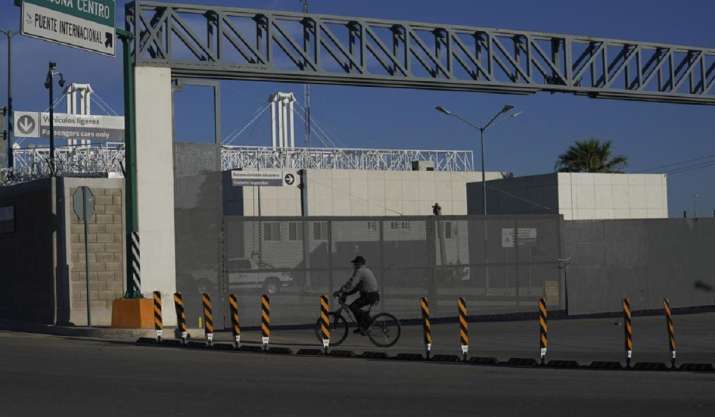
A man rides his bike near the main entrance closed to the International Border Bridge that connects the cities of Del Rio, Texas and Ciudad Acua, Mexico
The US will reopen its land borders to non-essential travel next month, ending a 19-month freeze due to the COVID-19 pandemic as the country requires all international visitors to be vaccinated against the coronavirus. Vehicle, rail and ferry travel between the US and Canada and Mexico has been limited to essential travel such as business since the early days of the pandemic. The new rules, to be announced on Wednesday, will allow fully vaccinated foreign nationals to enter the US regardless of reason to begin travel in early November, when the country has similar restrictions for air travel. will be relaxed.
By mid-January, essential travelers wishing to enter the US, like truck drivers, will also need to be fully vaccinated.
Senior administration officials previewed the new policy late Tuesday, speaking on condition of anonymity ahead of a formal announcement.
Both Mexico and Canada have pressured the US for months to ease travel restrictions that have separated families and banned leisure trips since the start of the pandemic. The latest move comes after last month’s announcement that the US would end country-based travel restrictions for air travel, and instead require vaccinations for foreign nationals wishing to enter by plane.
Officials said both policies will take effect in early November. He did not specify any specific date.
The new rules only apply to legal entry into the US. Officials cautioned that those who wish to enter illegally will still be subject to expulsion under the so-called Title 42 authorization, first enforced by former President Donald Trump, which has increasingly allowed migrants to seek asylum before seeking asylum. Immigration advocates have criticized the removal. One of the officials said the US is continuing with this policy because cramped conditions at border patrol facilities pose a COVID-19 threat.
According to officials, passengers entering the US by vehicle, rail and ferry will be asked about their vaccination status as part of the standard US Customs and Border Protection entry process. At the discretion of the authorities, passengers will have proof of vaccination verified in a secondary screening process.
Unlike air travel, which requires proof of a negative COVID-19 test before boarding a flight to enter the US, no test will be required to enter the US on land or sea, provided Meet the traveler vaccination requirement.
According to the Centers for Disease Control and Prevention, the US will accept travelers who have been fully vaccinated with any vaccine approved for emergency use by the World Health Organization, not just those in use in the US. This means the widely used AstraZeneca vaccine will be accepted in Canada.
Officials said the CDC was still working to formalize procedures for accepting those receiving doses of two different vaccines, as was fairly common in Canada.
Officials said the delay in requiring vaccinations for essential cross-border travel is meant to provide truck drivers and others with extra time to get a shot and reduce potential economic disruption from the vaccination mandate.
All told, the new procedures move toward policy based on individuals’ risk profiles, rather than less targeted country-based sanctions.
The vaccination requirement for foreign nationals comes as the White House enacted widespread immunization-or-testing requirements affecting 100 million people in the US to encourage holdouts to get the shots.
On Tuesday, the US Department of Labor completed a preliminary draft of an emergency regulation that would require employers of 100 or more workers to have their employees vaccinated or tested weekly against COVID-19. The Office of Management and Budget is now reviewing the order before implementing it.
Mexico has not put in place any COVID-19 entry procedures for travelers. Canada allows the entry of fully vaccinated individuals with proof of vaccination against COVID-19 as well as proof of a negative test done within 72 hours of entry into the country.
(with inputs from AP)
Read also | US to use $1 billion for rapid, at-home Covid tests
.